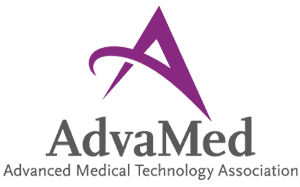AdvaMed Code 2022 Updates: What you need to know.
April 28, 2022On March 18, 2022, the Advanced Medical Technology Association ("AdvaMed") announced approval of a revised Code of Ethics on Interactions with Health Care Professionals, also known as the "AdvaMed Code" or the "Code." This new version with some welcome additions becomes effective on June 1, 2022.

According to AdvaMed, the updates are intended to reflect the "evolving legal, regulatory, and health care landscape."
Medical device and pharmaceutical companies interact with health care professionals ("HCPs") in various capacities from product conceptualization through commercialization. Device manufacturers consult the AdvaMed Code to inform their decision-making and to ensure their policies are consistent with industry standards. Several states (e.g., California, Nevada, Connecticut) have enacted laws that require device manufacturers to comply with industry codes like the AdvaMed Code. Other states have gone even further in regulating manufacturers (e.g., Vermont, Massachusetts). The principles in the AdvaMed Code mirror the Federal health care fraud and abuse laws, including the U.S. Federal False Claims Act ("FCA") and the U.S. Federal Anti-Kickback Statute ("AKS") (and its Safe Harbors), as well as U.S. Food and Drug Administrative ("FDA") regulations and Department of Health and Human Services Office of Inspector General guidance ("OIG").
What Changed?
AdvaMed updated its FAQs, definitions, and we have provided a brief summary of key updates to the AdvaMed Code below. You can access the updated Code in its entirety here: Updated AdvaMed Code (2022).
Alcohol

A hot topic! AdvaMed did not go so far as to prohibit alcohol at company events (like PhRMA did), but they did make updates to address it more explicitly. An FAQ was added stating that companies should consider implementing controls or limits around the provision of alcohol at company events. For example, per-person drink limits, limits on the types of alcohol served, and prohibiting alcohol at certain events. AdvaMed hinted that this topic was added in response to the OIG's Special Fraud Alert on Speaker Programs (which we previously reported on here).
Virtual interactions

The pandemic has prompted a shift to a more virtual world, which includes how HCPs and industry interact. We have previously reported on virtual programs here. AdvaMed added the definition of "virtual" to its glossary and made several updates throughout the AdvaMed Code to account for virtual settings for trainings, education programs, and company business meetings. The same rules apply to virtual interactions, but a virtual setting is now specifically called out. For example, the Code considers in FAQ #29 whether modest meals or refreshments may be provided virtually. Considerations include maintaining compliance with existing requirements outlined in the Code and creating a process to control ordering and delivery, tracking attendance to ensure that only appropriate participants in the meeting receive meals/refreshments, and/or prohibiting home delivery.
Value-based care arrangements

In an effort to align with the new Value-Based AKS Safe Harbors (which we previously reported on here), AdvaMed has added the definition of "value-based case" to its glossary and has incorporated concepts associated with value-based care arrangements throughout the Code. The updated Code also modified its "Key Concepts" for engaging HCPs to include "assisting in the development, evaluation, or implementation of an arrangement to advance value-based care." AdvaMed goes on to state, "even if no individual safe harbor may be fully applicable, a specific Value-Based Care arrangement may nevertheless be permissible under the Anti-Kickback Statute based on the particular facts and circumstances." See FAQ #4.
Other additions and modifications
- As referenced above, AdvaMed encourages "facts and circumstances" analysis to proposed arrangements involving value-based care arrangements. This "facts and circumstances" analysis is a theme found in several new places, e.g., FAQ #3 asks, "[w]hat if a proposed interaction with a Health Care Professional does not fit into an existing safe harbor* to the Anti-Kickback Statute?". The authors go on to state that just because a safe harbor is not available that a proposed interaction may still be lawful subject to the facts and circumstances at issue. We welcome this pragmatic approach.
- AdvaMed also added a section entitled, "Data-Driven Devices & Solutions" noting that companies "leverage health care data and technology innovation to enable new insights, support health and wellness, improve patient interventions and outcomes, and enhance the quality and efficiency of health care delivery." But, AdvaMed stops short of making any sweeping policy statements about the topic in the revised Code.
- The revised Code adds an FAQ that addresses factors to consider when deciding where to hold company meetings (FAQ #10).
- The authors added FAQ #34 about the provision of accurate and objective reimbursement and health care economic information ("HCEI") when negotiating contracts with HCPs. In a nod to the FDA HCEI guidance, AdvaMed states that a company "may provide accurate and objective information relating to the economically efficient use of its Medical Technologies, including in the context of value- and outcomes-based contracting. A Company may not, however, interfere with a Health Care Professional's independent clinical decision-making or provide such information as an unlawful inducement."
- Lastly, the Code was revised to highlight the importance of documenting legitimate business need and fair market value analysis when engaging an HCP, stating, "a company should maintain appropriate documentation regarding the process for determining legitimate need, fair market value compensation, and other relevant factors."
As a welcome addition, AdvaMed has also stated that they intend to develop tools aimed at small companies to assist them in implementing these updates into their compliance programs.
What now?
Now is the time to assess your company's readiness for compliance with the revised Code. You can do this by auditing your policies, procedures, and practices. We routinely audit companies for compliance with industry codes (e.g., AdvaMed, PhRMA) as well as the Food, Drug and Cosmetic Act; Anti-Kickback Statute; False Claims Act; OIG guidance; HIPAA; GDPR; and transparency (Sunshine) and gift ban laws. Gardner Law also designs, implements, trains-on, and manages health care compliance programs for clients.
Have questions? Contact us.
Information provided on this website is not legal advice. Communications sent to or from this site do not establish an attorney-client relationship. © 2022 Gardner Law. All Rights Reserved.